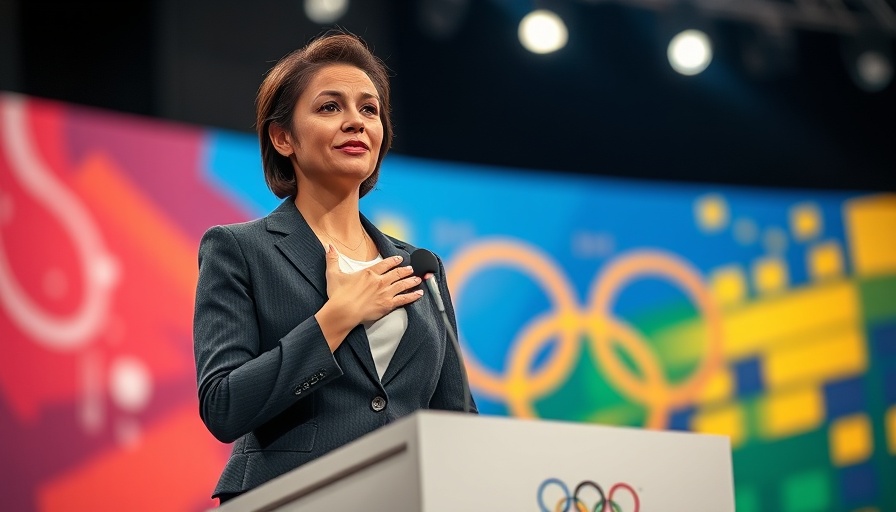
Kirsty Coventry Makes History as IOC President
In a watershed moment for global sports governance, Kirsty Coventry, the iconic Zimbabwean swimmer and current Sports Minister, has been elected as the president of the International Olympic Committee (IOC), becoming both the first woman and the first African to hold this prominent position. Coventry's election at the youthful age of 41 marks a significant milestone not just for her, but for women and Africans worldwide, who have been underrepresented in leadership roles across various sectors, especially in international sporting organizations.
In 'Zimbabwean Kirsty Coventry elected International Olympic body president,' the discussion dives into Coventry's landmark achievement, exploring key insights that sparked deeper analysis on our end.
A Competitive Race Unfolds
The election, characterized by unpredictability and intense competition, saw Coventry triumph decisively in the first round of voting, outperforming notable figures such as Britain’s Sebastian Coe, Spain’s Juan Antonio Samaranch Jr. and France’s David Lappartient, among six other candidates. With nearly 100 IOC members participating in this historic election, her victory was unexpected for many, as there had been no clear frontrunner prior to the voting.
The Significance of Leadership Diversity in Sports
Coventry’s ascent to the presidency carries profound implications. As scrutiny intensifies on governance structures and accountability within international organizations, her election is a galvanizing development that could inspire policy shifts promoting inclusivity and equality. It comes at a time when the IOC is facing substantial pressure to evolve and adapt to the challenges posed by modern sports, from ethical governance to broader societal impacts.
What This Means for Africa and Sports Governance
Her election doesn’t just signify a personal achievement; it underscores the potential for African leaders in international roles. Historically, African nations have struggled for representation on the global stage. Coventry’s role could serve as a catalyst for change, potentially enhancing Africa's footprint in international sports and governance.
Reshaping the Olympic Vision
Coventry's presidency paves the way for important discussions about the future of the Olympics. With an emphasis on sustainability, youth engagement, and the incorporation of technology in sports, she embodies a forward-thinking approach essential for the IOC's relevance in the 21st century. Her leadership might bring fresh perspectives on how the games can connect with younger generations, who are becoming increasingly critical of traditional structures and practices.
Lessons Learned from Coventry’s Campaign
The election process was not merely a contest of skill and talent; it was also an educational journey that exposed the intricacies of political maneuvering within high-stakes environments. Successful advocates must navigate alliances and practice diplomatic engagement, skills that will serve Coventry well as she embarks on her term. Reviewers can extrapolate strategies from Coventry's campaign that are applicable in various contexts, whether in sports, politics, or business.
Expectations and Challenges Ahead
As she prepares to succeed outgoing president Thomas Bach, who has led for over a decade, expectations are high. Coventry not only needs to address issues like gender equity and anti-doping measures but will also be pressured to innovate in governance practices and enhance the IOC's global brand. The new IOC president must confront the pressing issues of political unrest, polarization, and perceptions of corruption, especially as many countries grapple with conflicting interests concerning sports and societal values.
The Historical Context of Olympic Leadership
The IOC has had a predominantly male leadership throughout its history, creating room for implications from Coventry’s presidency. How this shift in leadership may influence broader socio-political narratives about female leadership in traditionally male-dominated environments remains to be seen. With support from both grassroots efforts and significant stakeholders, her leadership could inspire a generation of female athletes and future leaders.
Join the Celebration of a Groundbreaking Shift
Kirsty Coventry’s election is a historic turning point not just for the Olympics but for the possible futures of sports leadership across the globe. It’s worth noting how important it is to foster environments that encourage diversity at the highest echelons. Whether as a sports fan or a professional in governance, staying engaged with the transformations taking place within the IOC could provide unique insights into the evolving nature of sports and leadership.
As we navigate through the changing tides of global sports governance, we encourage our readers to follow these developments closely and to advocate for policies promoting inclusivity and equality within their own regions. Anyone interested in sports, governance, and the future of leadership will certainly benefit from engaging with the new initiatives and ideas championed by Coventry and her successors.
 Add Row
Add Row  Add
Add 




Write A Comment